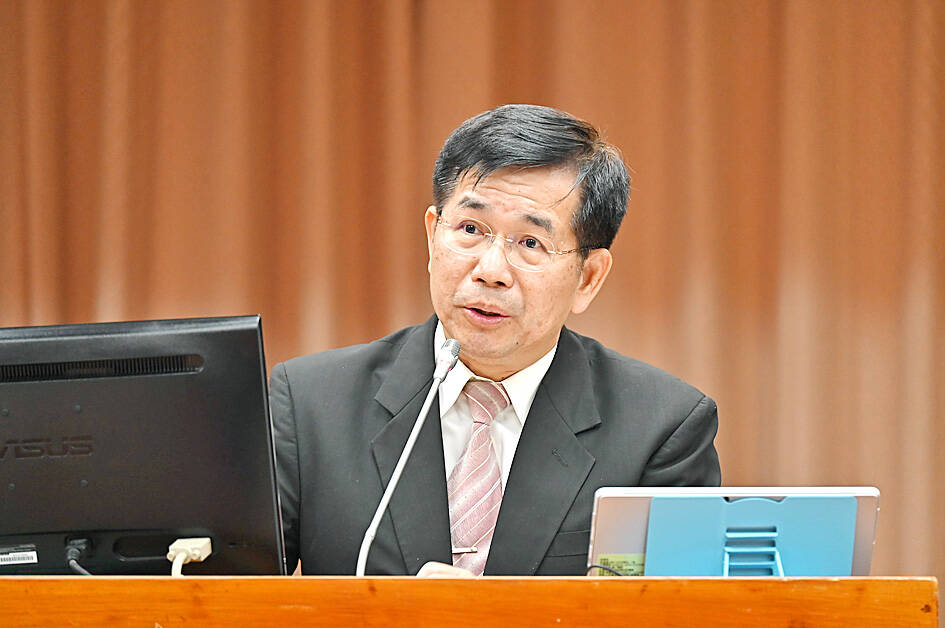The International Industrial Talents Education Special (INTENSE) Program to attract foreigners to study and work in Taiwan will provide scholarships and a living allowance of up to NT$440,000 per person for two years beginning in August, Minister of Education Pan Wen-chung (潘文忠) told a meeting of the legislature’s Education and Culture Committee yesterday.
Pan was giving an update on the program’s implementation, a review of universities’ efforts to recruit international students and promotion of the Taiwan Huayu Bilingual Exchanges of Selected Talent (BEST) program.
Each INTENSE Program student would be awarded a scholarship of up to NT$100,000 per year for up to two years through the National Development Council, as well as a living allowance of at least NT$10,000 per month, which would be provided by companies, but they are obliged to work in Taiwan for two years after graduation, he said.

Photo: Tu Chien-jung, Taipei Times
The program, which is to begin in August when the new academic year starts, has recruited 2,301 students, with 35 schools participating, he said.
There will be 123 classes — 102 classes in the fields of science, technology, engineering and mathematics (STEM), 15 in semiconductors and six in finance — and the program is to be conducted in cooperation with 197 firms, he added.
Meanwhile, the International Programs of Industry-Academia Collaboration in Taiwan to recruit students from the New Southbound Policy countries has launched 50 classes in the past few years and trained more than 20,000 students, he added.
Among the program’s 4,963 graduates over the past five years, 3,803 stayed to work in Taiwan, an employment rate of 77 percent, he said.
The number of international undergraduate students has grown steadily over the years, he said.
There are now 116,038 international students enrolled in the 2023 school year, an increase of 9,971 students from the previous year and accounting for 10.6 percent of all students, he said, adding that 67,299 of them are studying for a degree.
Pan added that 71,012 of the international students are from New Southbound Policy countries, with the majority coming from Vietnam, Indonesia and Malaysia.
Asked about stateless students from Tibet by Democratic Progressive Party Legislator Chen Pei-yu (陳培瑜), Pan said that response measures are available through cross-ministerial cooperation.
Chinese Nationalist Party (KMT) Legislator Hung Meng-kai (洪孟楷) asked about past cases of students from New Southbound Policy countries being forced to work off-campus illegally.
Pan said that was an issue when the program was just starting, but the ministry has since demanded that universities directly recruit students on their own instead of relying on intermediary agencies and that the recruitment process be conducted in their local language.
The ministry had imposed heavy penalties on a few schools for improper conduct, and some schools have shut down, he added.

AIR SUPPORT: The Ministry of National Defense thanked the US for the delivery, adding that it was an indicator of the White House’s commitment to the Taiwan Relations Act Deputy Minister of National Defense Po Horng-huei (柏鴻輝) and Representative to the US Alexander Yui on Friday attended a delivery ceremony for the first of Taiwan’s long-awaited 66 F-16C/D Block 70 jets at a Lockheed Martin Corp factory in Greenville, South Carolina. “We are so proud to be the global home of the F-16 and to support Taiwan’s air defense capabilities,” US Representative William Timmons wrote on X, alongside a photograph of Taiwanese and US officials at the event. The F-16C/D Block 70 jets Taiwan ordered have the same capabilities as aircraft that had been upgraded to F-16Vs. The batch of Lockheed Martin

GRIDLOCK: The National Fire Agency’s Special Search and Rescue team is on standby to travel to the countries to help out with the rescue effort A powerful earthquake rocked Myanmar and neighboring Thailand yesterday, killing at least three people in Bangkok and burying dozens when a high-rise building under construction collapsed. Footage shared on social media from Myanmar’s second-largest city showed widespread destruction, raising fears that many were trapped under the rubble or killed. The magnitude 7.7 earthquake, with an epicenter near Mandalay in Myanmar, struck at midday and was followed by a strong magnitude 6.4 aftershock. The extent of death, injury and destruction — especially in Myanmar, which is embroiled in a civil war and where information is tightly controlled at the best of times —

China's military today said it began joint army, navy and rocket force exercises around Taiwan to "serve as a stern warning and powerful deterrent against Taiwanese independence," calling President William Lai (賴清德) a "parasite." The exercises come after Lai called Beijing a "foreign hostile force" last month. More than 10 Chinese military ships approached close to Taiwan's 24 nautical mile (44.4km) contiguous zone this morning and Taiwan sent its own warships to respond, two senior Taiwanese officials said. Taiwan has not yet detected any live fire by the Chinese military so far, one of the officials said. The drills took place after US Secretary

THUGGISH BEHAVIOR: Encouraging people to report independence supporters is another intimidation tactic that threatens cross-strait peace, the state department said China setting up an online system for reporting “Taiwanese independence” advocates is an “irresponsible and reprehensible” act, a US government spokesperson said on Friday. “China’s call for private individuals to report on alleged ‘persecution or suppression’ by supposed ‘Taiwan independence henchmen and accomplices’ is irresponsible and reprehensible,” an unnamed US Department of State spokesperson told the Central News Agency in an e-mail. The move is part of Beijing’s “intimidation campaign” against Taiwan and its supporters, and is “threatening free speech around the world, destabilizing the Indo-Pacific region, and deliberately eroding the cross-strait status quo,” the spokesperson said. The Chinese Communist Party’s “threats